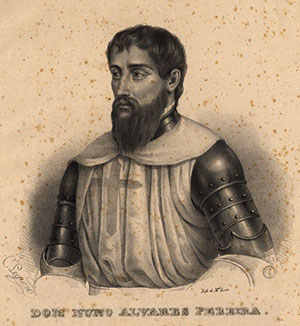Feast day: Nov. 6
 Nuno Álvares Pereira was born in the village of Bomjardin near Lisbon, Portugal, on June 24, 1360.
Nuno Álvares Pereira was born in the village of Bomjardin near Lisbon, Portugal, on June 24, 1360.
He was born the illegitimate son of Brother Alvaro Gonçalves Pereira, who was a professed member of the Order of Hospitalier Knights of St. John of Jerusalem. Nuno’s parents never married since his father was a professed member of a religious organization. Alvaro Gonçalves Pereira had a total of 32 illegitimate children. Nuno’s grandfather was the 97th Archbishop of Braga.
About a year after his birth, Nuno’s birth was legitimized by royal decree. This action enabled Nuno to receive a knightly education, which was the expectation for children born of nobility.
At 13 years old he became page to the queen, and he was created a knight. At the insistence of his father, Nuno, then 16, was married to a rich, young widow, Doñna Leonor de Alvim. The couple had three children, but two children died in early childhood. His daughter, Beatrice, married Alfonso, first Duke of Bragança, son of King João I (John).
Nuno, the Soldier
In 1383, the then king, Fernando, died without an heir. His brother John struggled for the throne with the King of Castile, who was married to John’s sister. Nuno supported John because he did not want Portugal to be incorporated into Castile. Several of his brothers, however, supported the King of Castile.
Throughout the war, Nuno displayed great valor. He was also acknowledged as a great military strategist. In 1384 he overcame the Castilians at the Battle of Atoleiros. As a result, at 25 years of age, he was declared constable, or supreme commander of the Portuguese army.
The constable’s courage and valor continued, when later in 1385, he won the battle of Aljubarrota and brought the war to an end. Dom Nuno Álvares Pereira became the national hero of Portugal. As a member of the nobility, and as a soldier, he gained great wealth during his first 60-plus years. Throughout his long military career, he put the interests of his nation above his own and served his people in spite of any personal risk.
Nuno, a Man of Prayer
Throughout his years as a soldier, Nuno lived a life of deep spirituality. On the field of battle, he would kneel and pray. He encouraged his soldiers to receive the sacraments as often as they could. He discouraged them from participating in immoral activities that were so common among soldiers of the day.
His life of piety included an intense devotion to the Blessed Sacrament and to the Virgin Mary. He was totally dedicated to Marian prayer, and he fasted in Mary’s honor on Wednesdays, Fridays and Saturdays.
His personal banner or standard was divided into four quadrants divided by a cross. In the quadrants was a depiction of Mary standing at the foot of the cross, Mary, Mother of God, and his two knightly role models, St. George and St. James.
Nuno also did not keep his wealth to himself. He was generous to the poor and generous to the Church. He built multiple churches dedicated to Our Lady throughout Portugal, including the Carmelite church and monastery in Lisbon.
After peace finally came to Portugal, Nuno gave away most of his wealth to war veterans.
Nuno, the Carmelite
Dom Nuno’s wife died in 1387, when he was 27 years old. He chose not to re-marry and lived a celibate lifestyle. This was a radical choice, but one built on his already acknowledged spiritual path. He dedicated himself to practices of chivalry, prayer, benevolence and living a life inspired by the Gospels. When he was 63 years old, on Aug. 15, 1423, Nuno entered the Carmel in Lisbon, a monastery that he had constructed years before.
He wanted no special treatment because of his highly respected position among the nobility of Portugal or his brilliant, victorious military career. He entered Carmel as a lay brother and took the name Brother Nuno of Saint Mary. He only wanted to serve his Lord and Mary his patroness.
In the Rule of St. Albert, the Rule followed by Carmelites, Chapter 19 speaks of spiritual armor. Nuno gave up the armor of war and took on the spiritual armor of Carmel. In his years as a Carmelite lay brother, he dedicated his life to serving the poor, and he organized a program for dispensing food to the poor and needy.
Nuno had a brilliant military career, was a member of nobility and was a friend of kings. On his deathbed he was visited by King John, who considered Brother Nuno to be his best friend. That was no wonder since it was Nuno who helped to establish John as king in the Royal House of Brançaga.
As Brother Nuno was dying, he asked that the Passion from John’s Gospel be read to him. As the reader spoke “Behold thy Mother!”, Nuno Álvares, Constable of Portugal and Carmelite Brother, died on Easter Sunday, April 1, 1431.
Nuno’s Popularity
Upon his death, Nuno was immediately considered a saint by the people who called him “O Holy Constable!” Even before his death, statues dedicated to his heroism were erected throughout Portugal.
The fame of his holiness continued to grow, as did the amount of time required to process a canonization. The process was initiated immediately by the Portuguese sovereigns and then by the Carmelite Order. Obstacles were many, but in 1894 the Postulator General for the Carmelites introduced the process again. In 1918 Dom Nuno was beatified by Pope Benedict XV. He was canonized in 2009 by Pope Benedict XVI.
— Penny Watkins, T.O.Carm. Special to the Catholic News Herald.
Sources: Vatican Archives, news notices, Carmelite informational biographies, and the Pastoral Letter from the Catholic Bishops’ Conference of Portugal.


